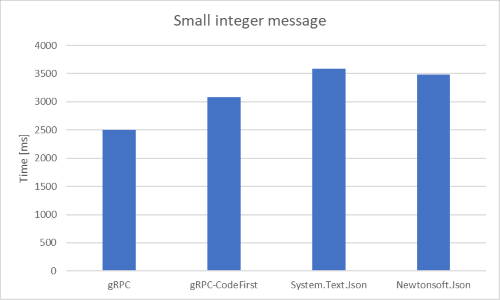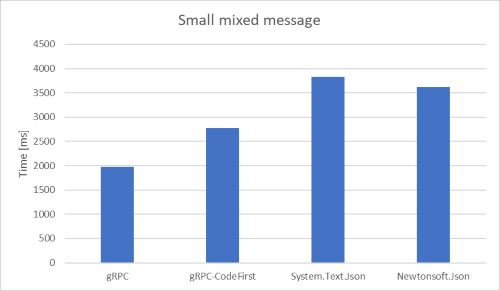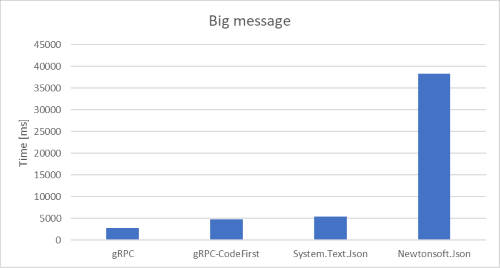gRPC has received first class support in ASP.NET Core 3 from Microsoft. It’s a binary RPC protocol based on Protocol Buffers created by Google that works on top of HTTP/2. It offers good performance and integration with many programming languages. Let’s try out together this new feature by looking at code generated by Visual Studio gRPC project template.
You can find code described in this post on my GitHub repo.
Basic project structure
After we create project from the gRPC service template, we have following files structure:
│ appsettings.Development.json
│ appsettings.json
│ Program.cs
│ Startup.cs
│ TryingOut.gRPC.Service.csproj
│
├───Properties
│ launchSettings.json
│
├───Protos
│ greet.proto
│
└───Services
GreeterService.cs
Proto file
gRPC is based on proto files, so let’s start by looking at greet.proto:
- First thing is syntax version declaration - proto3 is the latest one
- csharp_namespace option says that all generated classes will be placed in
TryingOut.gRPC.Service namespace
- package specifier is equivalent of C# namespace concept in protocol buffers
- The rest of file defines single method of a service, its input and output types
It’s worth noting that fields in messages have to be ordered explicitly. The order should not be changed after publishing the service otherwise we ask for backward compatibility issues.
All in all, I’d say that file looks nice and clean, there’s little boilerplate and RPC contract is outlined in a concise way.
syntax = "proto3";
option csharp_namespace = "TryingOut.gRPC.Service";
package Greet;
// The greeting service definition.
service Greeter {
// Sends a greeting
rpc SayHello (HelloRequest) returns (HelloReply);
}
// The request message containing the user's name
message HelloRequest {
string name = 1;
}
// The response message containing the greetings.
message HelloReply {
string message = 1;
}
A glance at .csproj file
Let’s go to the .csproj file. Here we have Protobuf item with GrpcServices="Server" property which instructs msbuild task to generate server-side code of gRPC service.
<ItemGroup>
<Protobuf Include="Protos\greet.proto" GrpcServices="Server" />
</ItemGroup>
Generated code
After build we can peek at the generated code, which is in obj directory.
obj\Debug\netcoreapp3.0\Greet.cs
obj\Debug\netcoreapp3.0\GreetGrpc.cs
Service class
We consume generated code by inheriting from base service class. We just have to put our logic into overrides.
The base class doesn’t offer much methods or properties to use. Whole info about context of the request is passed through ServerCallContext parameter.
public class GreeterService : Greeter.GreeterBase
{
// ...
public override Task<HelloReply> SayHello(HelloRequest request, ServerCallContext context)
{
return Task.FromResult(new HelloReply
{
Message = "Hello " + request.Name
});
}
}
Configuration in Startup
To make this work we have to configure gRPC in Startup class by calling AddGrpc and mapping all gRPC services. We have to do that by using Endpoint Routing, which got a lot of attention in the release of ASP.NET Core 3. One of the goals of Endpoint Routing is to allow seamless integration of multiple endpoint handlers in single application - we can freely mix MVC controllers and gRPC services in same project.
public void ConfigureServices(IServiceCollection services)
{
services.AddGrpc();
}
public void Configure(IApplicationBuilder app, IWebHostEnvironment env)
{
// ...
app.UseRouting();
app.UseEndpoints(endpoints =>
{
endpoints.MapGrpcService<GreeterService>();
// ...
});
}
Creating a client
Let’s make a little console app that will consume the service.
The first step to accomplish that is adding necessary nuget packages:
- Grpc.Tools - MSBuild tasks which generate client code
- Google.Protobuf - protocol buffers implementation
- Grpc.Net.Client - gRPC client
<ItemGroup>
<PackageReference Include="Google.Protobuf" Version="3.10.0" />
<PackageReference Include="Grpc.Net.Client" Version="2.23.2" />
<PackageReference Include="Grpc.Tools" Version="2.24.0">
<PrivateAssets>all</PrivateAssets>
<IncludeAssets>runtime; build; native; contentfiles; analyzers; buildtransitive</IncludeAssets>
</PackageReference>
</ItemGroup>
The next thing which we have to do is linking .proto file from server and defining GrpcServices=Client property to configure client code generation. I guess the better way to handle that in the long run would be defining proto files in some shared project or directory, so that we emphasize through project structure that those files are something meant to be reused.
<ItemGroup>
<Protobuf Include="..\TryingOut.gRPC.Service\Protos\greet.proto" Link="greet.proto" GrpcServices="Client" />
</ItemGroup>
After those preliminary steps we can use generated code to communicate with the server.
static async Task Main()
{
var channel = Grpc.Net.Client.GrpcChannel.ForAddress("https://localhost:5001");
var client = new Greeter.GreeterClient(channel);
var response = await client.SayHelloAsync(new HelloRequest
{
Name = "Paweł"
});
Console.WriteLine($"Response from server: {response.Message}");
}
gRPC doesn’t work with IIS (yet)
As of today, IIS doesn’t support gRPC due to the issue with HTTP/2 trailing headers implementation in the http.sys Windows driver. The problem affects also Azure App Service as it uses IIS under the hood.
As David Fowler says it’s not going to be a quick fix, because it involves Windows update process. See the issue on GitHub AspNetCore repository for all details.
I’d say it’s one more instance of the problems stemming from Microsoft move away from single integrated ecosystem approach. It seems like the question “Will this work on IIS / Windows / Azure?” is becoming more and more relevant with the new features of the ASP.NET Core.
gRPC for .NET Framework
If you would like to use gRPC on .NET Framework 4.X, then you should take a look at protobuf-net.Grpc, which allows to do that. It also uses code-first approach, no need to write .proto files!
Closing thoughts
In a layered view of an application gRPC services sits in a similar place as controllers in the Api projects. However, HTTP is used purely as a transport protocol and nothing like RESTful principles applies here. This simplification takes away some design options, but I’d say it makes sense for RPC approach and can make development faster. We don’t even have to think of resource names for our API methods or their HTTP verbs. We just need to define proto files and consume generated code.
By choosing gRPC we sacrifice interoperability and plain-text advantages for sake of performance. However, good tooling which comes with gRPC reduces a lot of the usual friction related to working with binary protocols. I guess gRPC will find its place in .NET space mostly in internal APIs which require minimal serialization overhead.


